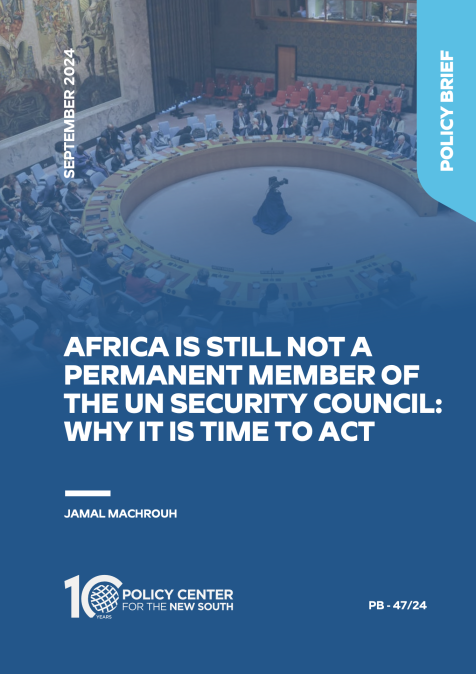In this interview, with Mr.Carlos Alexandre Monteiro Reis, Head of the Rabat Programme Office, UNOCT, Morocco, we discuss the current efforts being undertaken to counteract the radicalization of extremist movements, as well as the need for enhanced cooperation to support impoverished and less educated regions. We explore the connection between extremism and socioeconomic conditions, examining how collaboration can effectively address and mitigate these phenomena.
RELATED CONTENT
-
AuthorsMariam Ait MerriSeptember 30, 2024The bilateral relationship between Morocco and India has passed through three distinct phases, culminating in the current stage of strategic partnership. Initially marked by diplomatic formalities and limited engagement, the relationship gradually transitioned into a period of economic and cultural exchange, laying the groundwork for more substantial collaboration. This Policy Paper analyzes the historical trajectory of Morocco-India relations, tracing the development from these ear ...
-
AuthorsSeptember 27, 2024This paper examines the implications of the U.S.-China trade war for developing countries, particularly in light of the 2024 U.S. presidential election. The study traces the origins and escalation of the trade conflict, analyzing its multiple impacts on global trade patterns and economic growth. While some developing countries have benefited from trade diversion and supply-chain shifts, others, especially resource-exporting nations and the least-developed countries, have faced signi ...
-
Amal El Ouassif, Iván MartínSeptember 27, 2024La question de l'immigration occupe une place croissante dans le débat politique en Espagne. Alors qu’un tiers des Espagnols la considère comme le principal problème du pays, surpassant m ...
-
AuthorsSeptember 26, 2024This paper was originally published on t20brasil.org The developing world is once again facing unsustainable sovereign debt levels that threaten to erase several years of progress on development agendas. The COVID-19 pandemic, Russia-Ukraine war, and high interest rates are the latest in a series of events that have contributed to the recent build-up of debt and raised the cost of debt financing for developing countries. The G20’s Common Framework (CF) for debt treatments is a w ...
-
 AuthorsZakaria ElouaourtiSeptember 26, 2024This Paper was originally published on emerald.com Purpose Young graduates in Morocco are encountering an increasingly challenging labor market environment. Confronted with intense competition, job insecurity, and unclear career trajectories, many find themselves in low-skilled positions despite possessing relevant qualifications. This issue is particularly pronounced among vocational training graduates, who experience professional downgrading at a rate three times higher (33.6 ...
AuthorsZakaria ElouaourtiSeptember 26, 2024This Paper was originally published on emerald.com Purpose Young graduates in Morocco are encountering an increasingly challenging labor market environment. Confronted with intense competition, job insecurity, and unclear career trajectories, many find themselves in low-skilled positions despite possessing relevant qualifications. This issue is particularly pronounced among vocational training graduates, who experience professional downgrading at a rate three times higher (33.6 ... -
AuthorsSeptember 25, 2024This paper was originally published on t20brasil.org In a global context marked by unprecedented economic and environmental challenges, Africa stands at a crossroads. The rapid rise in public debt, coupled with the climate emergency, imposes a dual constraint on the continent's countries, severely limiting their ability to pursue sustainable development and mitigate the effects of climate change. This critical situation calls for innovative and effective solutions capable of tra ...
-
September 25, 2024بعد مرور عام على زلزال الحوز الذي خلف خسائر بشرية ومادية جسيمة في عدة أقاليم بالمغرب، تشهد عملية إعادة الإعمار تقدماً ملحوظاً، إلا أن التحديات لا تزال قائمة أمام استعادة الحياة الطبيعية للسكان المحليين. وبينما نراجع الإنجازات التي تحققت حتى الآن، ما هي الدروس التي يمكن استخلاصها لتعزيز ...
-
AuthorsSeptember 24, 2024This paper was originally published on t20brasil.org The resurgence of Neo protectionism as a reality is creating a pressing need to establish New Industrial Policies (NIPs) capable of striking a balance between Global Value Chains (GVC) managers' quest for efficiency and policy makers' need for more increasing resilience or national security in a turmoiled geopolitical landscape. Furthermore, although NIPs might pursue legitimate non-economic objectives, they are often captured ...
-
AuthorsSeptember 24, 2024Green industrial policies are essential to enable the structural transformations needed for a successful transition to a low-carbon economy. Because of the pressing need to decouple economic growth from environmental degradation, it is imperative to reallocate resources strategically from carbon-intensive sectors to sustainable, high-productivity industries. This transition is critical both to mitigate the impacts of climate change and to promote long-term economic growth and sustai ...
-
AuthorsSeptember 24, 2024Nearly 80 years after the establishment of the United Nations, Africa has yet to be granted a permanent seat on its most powerful organ, the Security Council. This "institutional discrimination" against African countries is both legally indefensible and politically untenable. Moreover, for Western nations seeking legitimacy and adaptation in a changing global geopolitical landscape, excluding 4 states representing over a billion people is strategically disadvantageous. This Policy B ...










